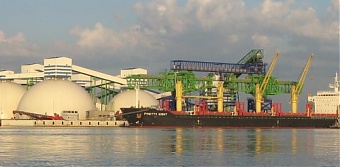Cargo, Latvia, Port, Transport
International Internet Magazine. Baltic States news & analytics
Monday, 23.02.2026, 11:46
Latvian ports' cargo turnover decreases 29.7% in January-September
 Print version
Print version |
|---|
In the first nine months, Latvian ports mostly handled bulk cargo - 15.48 million tons, which is 41.4% less than in the same period last year.
This included 3.031 million tons of coal (77.7% decrease), 3.848 million tons of grain and grain products (3.2% up), 1.484 million tons of wood chips (8.1% increase), and 1.424 million tons of chemicals (17.6% decrease).
In the first nine months of 2020, Latvian ports also handled 8.8 million tons of liquid cargo, a 20.2% decrease year on year, including 8.311 million tons of oil products - 19.9% decrease.
In turn, general cargo turnover at Latvian ports in January-September amounted to 8.916 million tons, 8.9% less than in the corresponding period of 2019, including 3.479 million tons of container cargo (4.4% less than a year ago), 2.785 million tons of timber (15.5% less), and 2.299 million tons of roll-on/roll-off cargo (9.8% down).
Riga Port remains the leading port in Latvia with 17.598 million tons of cargo transshipped in January-September, 26.4% less than in the same period of 2019.
Ventspils Port's cargo turnover stood at 9.639 million tons, 41.9% down, while Liepaja Port's cargo turnover was 4.686 million tons - 11.8% less than in the first nine months of 2019.
Of the small Latvian ports, Skulte Port posted the largest cargo turnover, 729,000 tons, which is 6.1% less than in January-September last year. In total, Latvian small ports transshipped 1.273 million tons of cargo in the first nine months of this year, which is 10.2% less than in the same period in 2019.
In 2019, Latvian ports handled 62.379 million tons of cargo, which was by 5.7% less than in 2018.
- 28.01.2022 BONO aims at a billion!
- 25.01.2021 Как банкиры 90-х делили «золотую милю» в Юрмале
- 30.12.2020 Накануне 25-летия Балтийский курс/The Baltic Course уходит с рынка деловых СМИ
- 30.12.2020 On the verge of its 25th anniversary, The Baltic Course leaves business media market
- 30.12.2020 Business Education Plus предлагает анонсы бизнес-обучений в январе-феврале 2021 года
- 30.12.2020 Hotels showing strong interest in providing self-isolation service
- 29.12.2020 В Латвии вводят комендантский час, ЧС продлена до 7 февраля
- 29.12.2020 В Rietumu и в этот раз создали особые праздничные открытки и календари 2021
- 29.12.2020 Latvia to impose curfew, state of emergency to be extended until February 7
- 29.12.2020 18-19 января Наталия Сафонова проводит семинар "Управленческий учет во власти собственника"








 «The Baltic Course» Is Sold and Stays in Business!
«The Baltic Course» Is Sold and Stays in Business!

